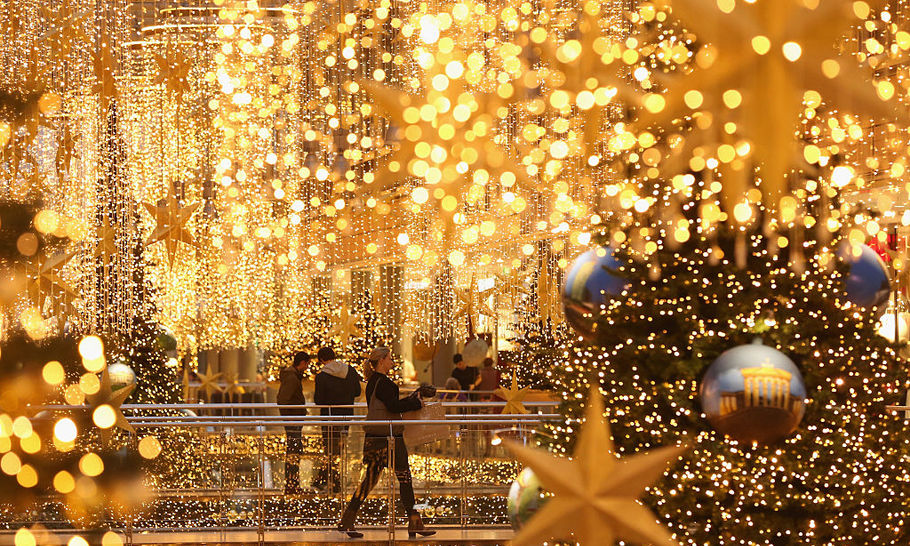Perhaps a year without Christmas wouldn't be such a bad thing

(Photo by Sean Gallup/Getty Images)
We are still in October but the supermarkets are already selling tat for Christmas. Stranger still, today’s BBC Radio 4 Today programme had three items about Christmas.
What was most striking was the cosy consensus. All four speakers interviewed thought Christmas was so important and in need of saving from Boris “Scrooge” Johnson. They all presented an astonishingly idealised Christmas — and yet, none of them mentioned religion once.
Who were these four people? Sir Ed Davey, Lord Sumption, OBE, PC, FSA, FRHistS and former Justice of the Supreme Court, Baroness Bakewell, DBE, and Professor Susan Michie. All white, middle-aged and gentile, and all very concerned about Christmas.
No Sikhs, Muslims, Hindus, Jews, who might have a rather different view of the central importance of Christmas or the importance of their own special religious holidays. No one whose children needs free school lunches who might be worried about how to pay for presents for their family this year or how to afford the petrol or the rail fares to visit grandparents. No one who thinks Christmas is about something more important than watching “Mrs. Brown’s Boys” on the telly.
And, most curiously of all, there was no one who takes a dissenting view and is relieved Christmas might not be happening this year. People who live on their own or are desperately lonely, for example, and have to listen to weeks of TV and radio presenters saying how wonderful it all is with that fake cheer we all hate. People who spend every Christmas driving from one set of parents or grandparents to another and find the whole thing hugely stressful. The many people whose marriages break up over Christmas because of the tension and animosity that builds up when families are forced to be together for a few days and have still not recovered from all the arguments during shutdown. Children who are shut up with arguing or violent parents with nowhere else to go for those few days.
All the Lords, Baronesses and Sirs on the Today programme seem to live in a world that hasn’t existed since Bing Crosby sang “White Christmas”, where everyone gathers happily round the turkey with their beloved families and toasts the Queen. Of course, the average age of these four speakers is almost seventy, so perhaps that is their experience of Christmas — but it didn’t seem to occur to the programme producers or presenters Justin Webb and Martha Kearney that Britain is perhaps not what it was in the 1950s. On every other subject they are more than happy to emote about the poor, the lonely and BAME people, but not, it seems, when it comes to Christmas. Mental health? A hugely important issue all the year round, but not for the poor or lonely at Christmas. Parents can’t afford to buy their children laptops in the run up to A-Levels, but we should drop all public health measures so that Christmas, that huge, bloated festival of consumerism, can carry on as usual.
I wonder how many people will be secretly, or not so secretly, delighted if there’s no Christmas this year. Perhaps this is a moment, long overdue when we should reconsider what’s happened to Christmas. How did it become this orgy of consumerism, from October to December 26? When did it stop being about Christian faith for so many people? Why this obsession with the family at Christmas so that those alone, bereaved or desperately unhappy in their families, are under such pressure to feel that they don’t belong, that they have somehow failed or are outsiders?
There is much to mourn this year but also much to be thankful for. People caring for their neighbours and fellow-citizens, for hungry children in their community, risking their own health and lives to care for the desperately ill, coming together to be thankful for our emergency workers. This is Britain at its best.
The question is not whether we should “do something quickly to save Christmas”, in Ed Davey’s wretched phrase, but what Christmas means to us in a fast-changing Britain and what we value and will continue to value next year as more of our fellow-citizens grieve for their loved ones or live isolated, cut off from others. Of course, the speakers and presenters on Today would agree with all of this. So why didn’t they say so?
A Message from TheArticle
We are the only publication that’s committed to covering every angle. We have an important contribution to make, one that’s needed now more than ever, and we need your help to continue publishing throughout the pandemic. So please, make a donation.





